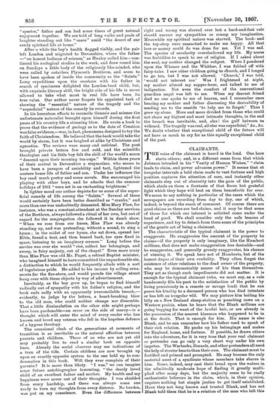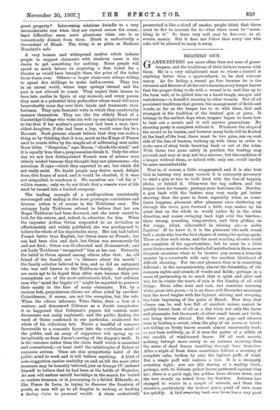CLAIMANTS.
THE voice of the claimant is heard in the land. One hare starts others; and, in a different sense from that which Johnson intended in his " Vanity of Human Wishes," " claim
leads to claim, and power advances power." It seems that at irregular intervals a bold claim made to vast fortune and high position captures the attention of men, and instantly other claimants step out of obscurity into the gaze of the public, which sheds on them a foretaste of that fierce but grateful light which they hope will beat on them henceforth for ever. We mean to say nothing in particular of the cases which the newspapers are recording from day to day, one of which, indeed, is beyond the reach of comment. Of course there are good claims as there are had claims, and it may be that some of those for which our interest is solicited come under the head of good. We shall consider only the safe lessons of experience, and try to detach from them some of the principles of the gentle art of being a claimant.
The characteristic of the typical claimant is the power to exaggerate. He exaggerates the amount of the property he claims—if the property is only imaginary, like the Humbert millions, that does not make exaggeration less desirable—and be exaggerates, and generally grossly exaggerates, his chance of winning it. We speak here not of Humberto, but of the honest dupes of their own credulity. They often forget the existence of other relations to the dead owner of the property, who may be demonstrably nearer of kin than themselves. They act as though such impediments did not matter. It is enough for the typical claimant (who, we must say, as a rule handsomely fills his part to the satisfaction of the public by living penuriously in a remote or savage land) that he can prove his kinship to a deceased person who has died intestate or has left an irregular will. We may picture him boiling his billy on a New Zealand sheep-station or punching cows on a Western prairie, when he hears that the Blank millions are going begging for want of the lawful heir, or are already in the possession of the nearest kinsman who happened to be in at the death. That is enough for him. His name is also Blank, and he can remember how his father used to speak of their rich relation. He packs up his belongings and makes for England, home, and fortune. If possible, he draws others into the adventure, for it is very true that your real claimant or pretender can go only a very short way under his own impetus. The Warbecks, Simnels, and other pretenders all need the help of stouter hearts than their own. The claimant must be fortified and primed and prompted. He may become the only material asset of a syndicate whose members take shares in him. Some, indeed, may cast their bread upon the waters in the admittedly moderate hope of finding it greatly multi- plied after many days, but the majority seem to be really enthusiastic believers in the claim, which, in their opinion, requires nothing but simple justice to get itself established. Have they not long known and trusted Blank, and has not Blank told them that he is a relation of the man who left this great property? Intervening, relations dwindle to a very inconsiderable size when they are viewed across the ocean; legal difficulties seem mere phantoms when one is so romantically distant from them. Blank is undoubtedly a descendant of Blank. The thing is as plain as Madame Humbert's safe.
A very human and widespread motive which induces people to support claimants with shadowy cases is the desire to get something for nothing. Some people will spend as much labour on acquiring a free ticket for a theatre as would have brought them the price of the ticket three times over. Others—a larger class—are always willing to spend five shillings to make half-a-crown. They live in an unreal world, where hope springs eternal and the past is not allowed to count. They expect their houses to turn into castles in Spain at any moment, and every person they meet is a potential fairy godmother whose wand will wave benevolently some day over their heads and transmute their fortunes. They spin fantastic webs in which they comfortably ensnare themselves. They are like the elderly Head of a Cambridge College who woke his wife up one night to point out to her that if her mother's great-aunt had been a man, their eldest daughter, if she had been a boy, would some day be a Baronet. Such persons almost believe that they can make a thing so by thinking that it is so, much as the Kings of France used to create titles by the simple act of addressing men under those titles. "Suspicion," says Bacon, "clouds the mind," and it is equally true that a prepossession clouds it. Only the other day we saw how distinguished French men of science were utterly misled because they thought they saw phenomena—the notorious N-rays—which they expected to see, but which did not really exist. No doubt people may derive much delight from this frame of mind, and it would be churlish, if it were not misguided, to condemn it. We ourselves are "all for it" within reason ; only we do not think that a roseate view of life need be turned into a limited company.
The leading example of a predisposition consistently encouraged and ending in the most grotesque convictions and fatuous action is of course in the Tichborne case. The unhappy Lady Tichborne refused to believe that her son Roger Tichborne had been drowned, and she never ceased to look for his return, and, indeed, to advertise for him. When the impostor Arthur Orton responded to an invitation so affectionately and widely published, she was predisposed to believe the whole of his improbable story. Her son had talked French better than English, but Orton knew no French ; her son had been slim and dark, but Orton was enormously fat and not dark ; Orton was ill-educated and ill-mannered ; and yet Lady Tichborne "recognised" him as her son. Naturally the belief in Orton spread among others after that. An old friend of the family saw " a likeness about the mouth" ; the family solicitor believed in him, and so did an antiquary who was well known to the Tichborne family. Antiquaries are more apt to be duped than other men because their pre- conceptions are of the most enthusiastic kind ; but ordinary men who "mind the biggin' o't " might be expected to preserve their sanity in the face of many claimants. Yet, by a curious fate, preposterous claims are often aided by accident. Coincidences, it seems, are not the exception, but the rule. When the odious informer, Titus Oates, drew a how at a venture, and denounced Coleman as a Jesuit conspirator, it so happened that Coleman's papers did contain some documents not easily explained ; and the public, finding the word of Oates confirmed in one particular, swallowed the whole of his ridiculous tale. Throw a handful of rumours favourable to a romantic figure into the credulous mind of the public, and an army of supporters will spring up as inexplicably as from Jason's sowing of the dragon's teeth. It is the romance rather than the claim itself which is examined and remembered,—at least until the catastrophe of failure or exposure arrives. Once set this sympathetic habit of the public mind to work and it will believe anything. A kind of auto-suggestion carries credulity on and on till the most utter nonsense may be honestly believed, just as George IV. induced himself to believe that he had been at the battle of Waterloo. As men will endure untold hardships in the search for buried or sunken treasure, or in journeying to a fabled Eldorado, or, like Ponce de Leon, in trying to discover the fountain of youth, so men will go to all lengths in making or backing a daring claim to personal wealth. A claim audaciotiely prosecuted is like a cloud of smoke; people think that there must be fire to account for it,—that there must be " some- thing in it." So there very well may be fire,—or, at all events, money. But it does not follow that every one who asks will be allowed to carry it away.



















































 Previous page
Previous page